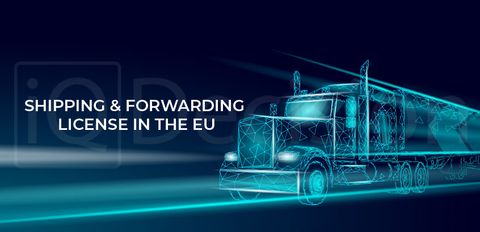The shipping & forwarding industry in the EU is booming which is why quite a few entrepreneurs are considering opening a freight forwarding business in this jurisdiction. However, starting a shipping & forwarding company requires obtaining a freight forwarding license in the EU. And that, in turn, requires following a number of regulatory requirements.
If you are considering starting a freight forwarding business, this article will provide you with lots of useful information.
Introduction
Forwarding is all about organizing transportation of goods for individuals or companies. In the strictest sense, the concept of “forwarder” includes forwarding and handling of goods for customers, including storage & transportation of cargo, preparation of documentation, insurance, and, in rare cases, customs clearance.
Depending on the type of vehicles with which the forwarder will work (air, water or transport), they will need to apply for different types of licenses. Given the length of roads in Germany alone, we can confidently conclude that the main transport for carrying goods across Europe is automobile.
Requirements placed on forwarders by CLECAT require obtaining a forwarding license or a general access license authorizing freight forwarding activities in the EU. Let’s take a look at two types of licenses forwarders are required to get in Germany and Bulgaria:
The main advantages of Germany include:
- Convenient geographical location
- Forwarder-friendly legislation;
- Excellent infrastructure
- A dense network of highways
The main advantages of Bulgaria include:
- Very liberal legislation
- Relatively low taxes
- Low starting costs
- Low salaries for professional drivers
We’ll be looking into registering a freight forwarding business and obtaining a freight forwarding license in the context of Germany. Why? Because under German law, involvement in forwarding activities only requires obtaining a transportation license.
International freight transporters seeking to operate in the EU must apply for an EU transportation license. Issued by a municipal authority, it bears the name of its owner and is valid for a period of 10 years. After expiration, the license may be renewed.
Stages of Obtaining a Freight Forwarding License in the EUTo give you a better idea of what it takes to open a freight forwarding business in the EU, we have divided the whole process into several stages:
- Registering a transportation company. For non-residents of Germany and the European Union, as well as Iceland, Liechtenstein and Norway, the best choice would be to register a GmbH company in Germany.
- Obtaining a certificate of professional competence. The director of the company and the transportation manager must have a specialized education and relevant work experience.
- Meeting the requirements of financial stability. The company must have a sufficient amount of material resources. At least 9,000 euros will be required if an application for a transportation license for one truck is submitted, +5,000 euros for each next truck. A certificate confirming the availability of funds can be obtained from the bank.
- Filing an application and obtaining a license.
- Establishing the accounting work of a new enterprise.
Documents required to obtain a license include:
- Application
- Evidence of reliability
- Certificate of company registration;
- List of shareholders
- A certificate from police
- Certificates from tax office
- Social Security Certificate (for employees only)
- Extract from the trade register
- Confirmation of financial status
- Evidence of qualifications of senior management:
- Certificate of passing driving test
- A list of vehicles to be used for freight transportation
- Other documents requested by a municipal authority.
Cost of Freight Forwarding License
Licensing costs may vary, depending on the area and city. On average, they range from two hundred and fifty five hundred euros for the license itself, and from fifty five to one hundred euros for a certified copy for each vehicle.
A company must have a permanent registered address and a registered office with proper equipment..
A transportation license may be denied for the following reasons:
- Deliberate provision of false information
- Unconfirmed qualifications of senior management
- Loss of license in the last twelve months
- Inadequate financial condition of the company
- Insufficient evidence of a company’s reliability.
Conclusion
Still have questions regarding obtaining a freight forwarding license in the EU? IQ Decision UK can help you by providing legal advice on all license-related matters. We can also accompany our clients throughout all stages of registering transportation activities in Europe, registration of licenses and other documents, and opening a corporate bank account.





